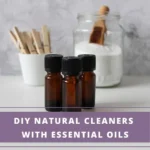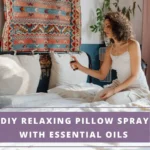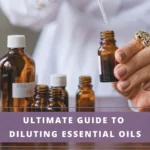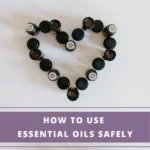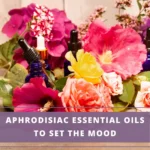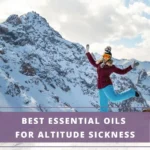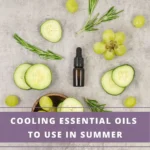As an Amazon Associate I earn from qualifying purchases. See Full Disclosure Here
There’s no denying the many benefits of aromatherapy and essential oils. However, to enjoy the benefits without the downsides, it’s really important to understand the cautions and concerns associated with using essential oils.
Yes, that’s right. Using essential oils the wrong way can do more harm than good. Essential oils are concentrated extracts of various plant parts. They are highly potent in their concentrated form and when used incorrectly, they can have an adverse effect.
Before you start using essential oils, here are some of the key cautions and concerns you should be aware about.
#1 – Talk to Your Doctor
This is particularly important if you are planning on using essential oils to manage any health condition.
If you are under the care of a doctor for a certain health condition, you must let your physician know about any essential oils you may be using or intend to try out so they can advise you on how to proceed.
#2 Always Test for Skin Sensitivity Before Topical Application
Some people may have especially sensitive skin. If you are prone to skin reactions, test a sensitive area such as the inside of your wrist, before applying a certain essential oil to another, more exposed part of your body such as your face.
#3 Never Use Concentrated Essential Oils Directly to Your Skin
Essential oils are highly potent. You could experience irritation or skin discoloration if you apply essential oils directly to the skin.
Before using any essential oil topically always dilute it with a carrier oil first. The best carrier oils for essential oils are olive oil, jojoba, coconut oil, and almond oil.
The carrier oil acts as a barrier between the essential oil and your skin, preventing any untoward reaction.
Learn more about the Best Carrier Oils for Essential Oils.
#4 Best to Avoid Essential Oils Completely if You Are Pregnant
The dispute regarding essential oils and pregnancy is still ongoing. The uncertainty is scary. I would strongly advise avoiding essential oils entirely if you’re expecting. It’s just not worth taking that chance.
Pregnant women who are over age 35 are considered to be in a higher-risk category and should be extra cautious about anything they are exposed to, including essential oils. Even a too-warm bath, with or without essential oils added, can cause complications in an unborn baby, particularly in the first trimester.
If you have to for any particular reason, speak to your doctor first and use extreme caution with essential oils. Check the label of each essential oil you purchase, to be sure of its safety.
#5 Watch For Undesirable Reactions
Essential oils can produce an undesirable reaction in some people. If you are prone to allergies, use caution when breathing in or applying essential oil to the skin.
For example, some people react to phenol, a compound of which is present in peppermint oil. This may result in shortness of breath. If this happens to you, either reduce the amount of oil used, blend with a milder oil, or avoid the offending essential oil altogether.
If you are allergic to the lavender plant, then lavender oil will likely irritate your skin or cause breathing problems if inhaled. Also note that a person may start out as being able to tolerate a specific oil, but can later develop a sensitivity to it. If an essential oil causes you discomfort of any kind, discontinue use.
#6 An Oil May Be Too Stimulating for You
Different people react differently to different oils. While some may find certain essential oils helps them stay more focused, others may find that it increases their anxiousness or excitability. This is commonly seen when using peppermint oil, rosemary oil, thyme oil, fir tree oil or pine oil.
One way to get the benefits of the oil without the stimulating effect is to combine very small amounts of the oil with other essential oils that are known to produce feelings of calm and well-being.
For example, invigorating peppermint, peaceful lavender, and mood-enhancing orange oil make a well-balanced blend that will be likely well received by your nose and nervous system.
#7 Be Careful When Using Essential Oils on Children
Essential oils may not be appropriate for children age 4 and under. This again will depend on the type of oil used. For example, eucalyptus oil slows the breathing which can be dangerous for young children.
Read more about Aromatherapy For Children: Important Things To Know
Be especially careful when using tea tree oil on your child. Tea tree oil contains terpenes, which are compounds also found in turpentine. This powerful substance makes tea tree a germ-fighting powerhouse but it may not be appropriate for the sensitive skin of children, even in minute amounts.
Tea tree oil contains terpenes, which are compounds also found in turpentine. This powerful substance makes tea tree a germ-fighting powerhouse but it may not be appropriate for the sensitive skin of children, even in minute amounts.
If you are using essential oils your child, I highly recommend using oils from Plant Therapy’s KidSafe line. KidSafe by Plant Therapy is the first-ever line of essential oils developed especially for children. This KidSafe Starter Set includes 6 effective essential oil synergy blends that are safe to use for children. You can buy the KidSafe Starter Set with Aromafuse Diffuser or just the set of 6 without a diffuser.
Disclaimer: This information is not intended to serve as medical advice. Please consult your doctor before using any natural medication or if you experience any unusual symptoms. See Full Disclaimer here


